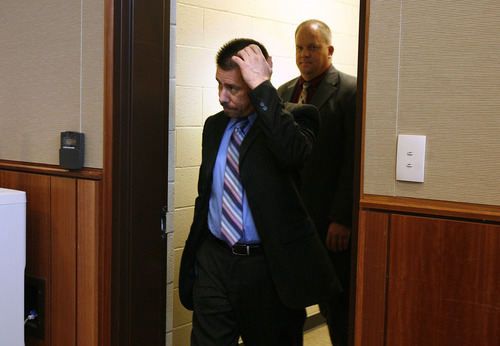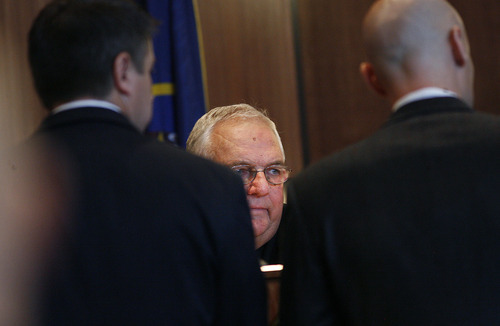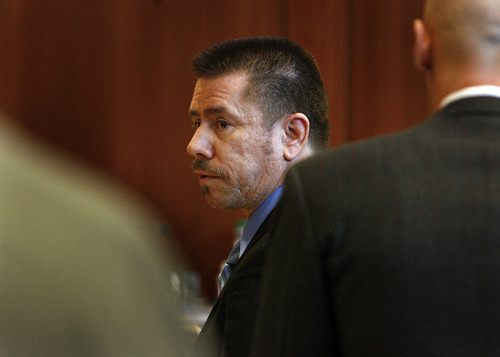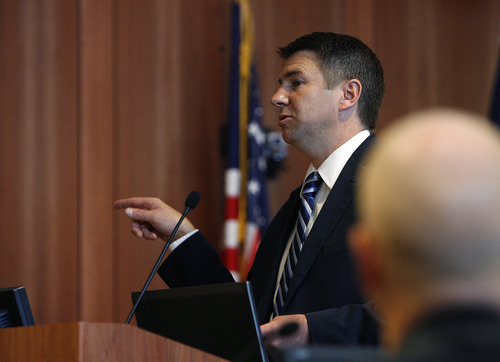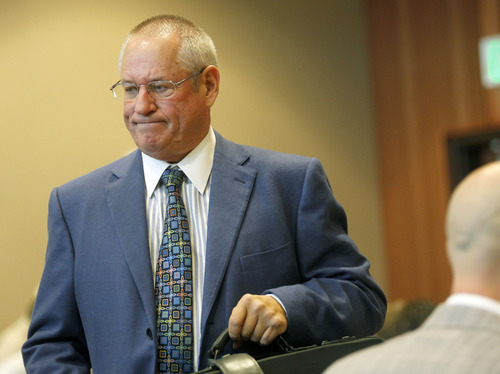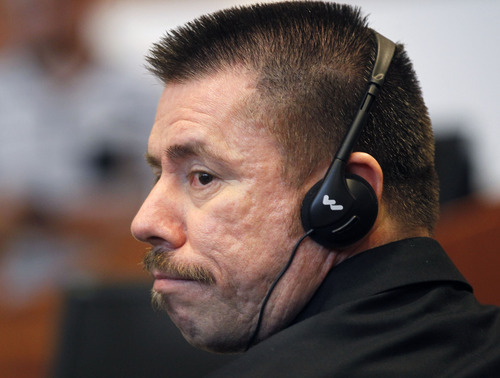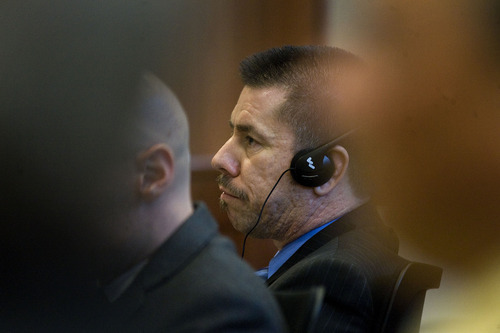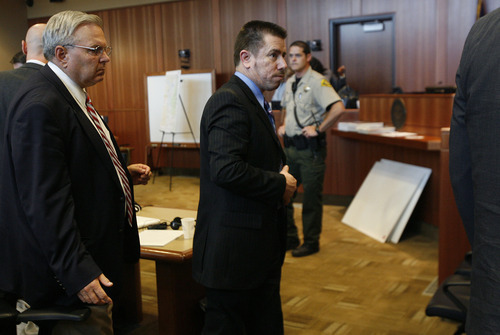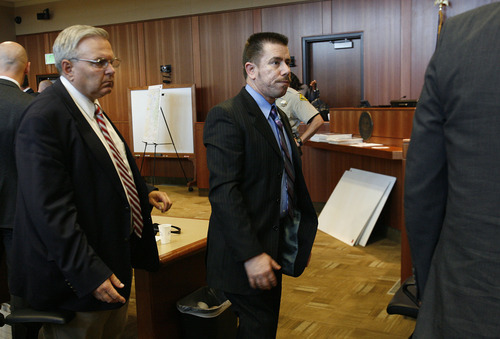This is an archived article that was published on sltrib.com in 2012, and information in the article may be outdated. It is provided only for personal research purposes and may not be reprinted.
Spanish Fork • Following a weeklong trial and eight hours of deliberation, a jury late Friday night acquitted Roberto Miramontes Román of the 2010 slaying of Millard County Deputy Josie Greathouse Fox.
A jury of six men and four women found Román, 40, not guilty of first-degree felony aggravated murder, but convicted him of felony counts of evidence tampering and illegal possession of a dangerous weapon.
Román will be sentenced on the two lesser counts Oct. 10 by 4th District Court Judge Donald Eyre.
Román on Thursday took the witness stand to claim that the deputy's own brother, Ryan Greathouse — who was allegedly involved in a drug deal just minutes before the fatal shooting — had pulled the trigger of the AK-47 that killed Fox.
Juror Nicole Kay told The Tribune there was "an absence of evidence about Ryan Greathouse — at all. We could not rule out the possibility that that story [told by Román] could be true."
Asked what jury deliberations were like, Kay replied: "Have you ever seen "12 Angry Men?" After a certain amount of deliberation, certain doubts came forward. We just had more and more doubts."
Doug Fox, the husband of Josie Fox, blamed the verdict on the judge, saying he had kept critical evidence from the jury.
Referring to Román's alleged confession to police, Doug Fox said: "He admitted he done it. That flat-ass tells you that he's guilty."
Defense attorney Stephen McCaughey said, "I think Román's testimony was what this case was all about. [Jurors] looked at that and all the other evidence and came to the conclusion that they did."
Millard County prosecutor Patrick Finlinson declined to comment.
Earlier Friday during closing arguments, Finlinson had worked to pick apart Román's version of how Fox died.
The deputy and detective who drove to Ryan Greathouse's home in Leamington after the Jan. 5 shooting said the man did not appear to have been crying, as Román testified Thursday. Deputies also questioned whether Román could have made the 22.8-mile drive from the shooting scene to Leamington in the nine or 10 minutes he said it took.
Finlinson blasted Román's story, calling it "insult to injury" and a "convenient" tale that prosecutors heard for the first time Thursday.
"Blame the dead guy," he said of Greathouse, who died in April 2010 of a drug overdose. "Blame the guy who can't defend himself. Blame the guy who can't respond."
"Ryan Greathouse did not kill his sister," Finlinson added.
The prosecutor added that Román's account, which contradicts a confession he gave police a day after Fox's death, does not fit with the evidence in the case.
"All of the credible evidence in this case, all the believable evidence, points to the inescapable fact that this defendant killed Josie Greathouse Fox and then ran away," Finlinson said.
But McCaughey told the jury: "The decision you must make is important. Here you can send a man to prison for the rest of his life."
The defense attorney said prosecutors had failed to present enough evidence for a conviction beyond Román's original confession to police, which Román said he gave because he feared for his children at the hands of Greathouse.
"[Román] knew what [Greathouse] could do," McCaughey said.
Outside the courtroom, Mike Román said he's glad his brother's story is out now. "He's been telling us all along he never done it."
When Román took the witness stand in his own defense Thursday he told the jury that after selling and smoking methamphetamine with Greathouse in the early morning on Jan. 5, 2010, he and Greathouse drove toward Hinkley. Román wanted to collect money Greathouse owed him for drugs, but Fox pulled them over.
Román said Greathouse picked up an AK-47, placed the weapon against Fox's chest and fired twice.
Greathouse began crying and told him that he had shot his sister, said Román, who claimed he drove Greathouse to his home after agreeing to take the blame for the shooting and intending to flee to Mexico.
Román — who later confessed to police that he, Román, had shot the deputy — said Thursday it was because Greathouse had threatened his family.
When defense attorneys asked Román why he didn't mention this following Greathouse's overdose death, which ended the potential threat, Román answered that the trial was his first chance to testify.
Police have testified seeing Greathouse's Ford truck and Román's Cadillac leave in separate directions following the meeting on McCornick Road, where the drug deal allegedly occurred.
But Román explained that a third man who was with them — someone whose name he does not remember — had agreed to drive Greathouse's truck home while Román and Greathouse went to collect the money.
Fox's sergeant, Rhett Kimball, has testified he saw two vehicles stop briefly on a rural road near McCornick. He ordered Fox to follow the Cadillac and gave her the go-ahead to make the traffic stop just outside of Delta because there was a question about whether the owner of the car had an outstanding warrant.
"10-4," Fox said over the radio just after 1 a.m. on Jan. 5. "I'll be over by the ballpark."
Those were the last words anyone heard from the 37-year-old deputy, prosecutors say, other than Román.
According to testimony earlier this week, Román fled north to Nephi and later to Salt Lake City, following the shooting. From there, he and another man, Ruben Chavez-Reyes, rode buses and TRAX trains south. They took a limousine around Utah County and later a cab to Beaver for $300. There they hoped to find a friend who could help them flee to Mexico, police said.
Prosecutors had intended to pursue the death penalty, but it was removed from consideration after Eyre determined Román was ineligible because he met the legal definition of mental retardation.
Twitter: @aaronfalk


